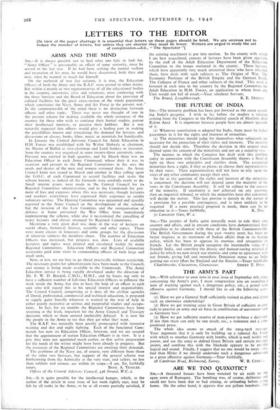LETTERS TO THE EDITOR
[In view of the paper shortage it is essential that letters on these pages should be- brief. We are anxious not to reduce the number of letters, but unless they are shorter they must be fewer. Writers are urged to study the art of compression.—Ed., " The Spectator 1
ARMS AND THE MIND
SIs,—It is always possible not to fmd what one fails to look for. "Army Officer" is presumably an officer of some seniority, since he served in the last war. If he had been seeking the mental welfare and recreation of his men, he would have discovered, both then and now, what he wanted so much for himself.
On the outbreak of war last autumn, it is true, the Education Officers of both the Army and the R.A.F. were posted to other duties. But within a month or two representatives of all the educational bodies in the country, university, civic and voluntary, were conferring with the three Services and the Board of Education about the provision of cultural facilities for the great cross-section of the whole population which constitutes the Navy, Army and Air Force in the present war.
In the commonwealth of the mind there is no distinction between officers and other ranks. There was never any thought of one in the present scheme for making available the whole resources of the country for those who wish to continue their formal studies, pursue their intellectual interests, or practise their hobbies. But it was naturally expected that officers would play a leading part in making the possibilities known and stimulating the demand for lectures and discussions or classes, books, films, music or materials for handicrafts. In January the Central Advisory Council for Adult Education in H.M. Forces was established with Sir Walter Moberly as chairman, the Master of Balliol as vice-chairman and Lord Sankey as treasurer.
Soon the country was organised in some twenty-three university areas. Pressure was exerted in high quarters, and by March there was an Education Officer in each Army Command, whose duty it was to ascertain and present to the Regional Committees in his area the needs and desires of the men and women stationed there. An Army Council letter was issued in March and another in May calling upon the G.O.C. of each Command to accord facilities and make the scheme known, as indeed all the Generals were cordially ready to do.
Small interim grants were made to the Central Council for its Regional Committee administration, and to the Commands for pay- ment of fees and expenses where this was necessary, though lecturers and teachers everywhere have expressed their eagerness to render voluntary service. The Haining Committee was appointed and speedily reported to the Army Council on the development of the scheme,
but the invasion of the Low Countries and the reorganisation of defence at home prevented the War Office from immediately implementing the scheme, while also it necessitated the cancelling of many lectures and classes arranged by Regional Committees.
Meantime a very great deal was done in the way of lectures on world affairs, historical, literary, scientific and other topics. There were many classes in languages and some groups for the discussion of whatever subjects the members chose. The number of Education Officers was increased, but progress was slow. Lists of available lecturers and topics were printed and circulated widely by many Regional Committees. Education Officers and Regional Committee secretaries paid joint visits to commanding officers of both large and small units.
Now, at last, we are free to go ahead practically without restriction. The necessary grants for administration have been made to the Council, and money is being made available to the Commands. The Army Education service is being rapidly developed under the direction of Mr. F. W. D. Bendall, C.M.G., H.M.I., and he hopes not only to have a sufficient number of full-time Education Officers to pr?nriote the work inside the Army, but also to have the help of an officer in each unit who will regard this as his special interest and responsibility.
The Central Council, comprising as it does all the civilian agencies of liberal, professional, commercial and technical education, is prepared to supply quite literally whatever is wanted in the way of help in either purely recreative or serious and purposeful studies and occupa- tions. In fact, for six months the Regional Committees have been straining at the leash, impatient for the Army Council and Treasury decisions which to them seemed intolerably delayed. It is now for the people in the Army to see that they get what they want.
The R.A.F. has naturally been greatly preoccupied with intensive training and day and night fighting. Each of the functional Com- mands has now its Education Officer, however, and we are assured that the appointment of station Education Officers is in view. It is a pity they were not appointed much earlier, so that active preparation for the needs of the writer might have been already in progress. But the resources of the Regional Committees are awaiting their demands. The problems of the Navy are, of course, very different from those of the other two Services, but support of the general scheme was forthcoming from the Admiralty at the very start, and sailors, no less than soldiers and airmen, are within its scope.—I am, Sir, faithfully


























 Previous page
Previous page